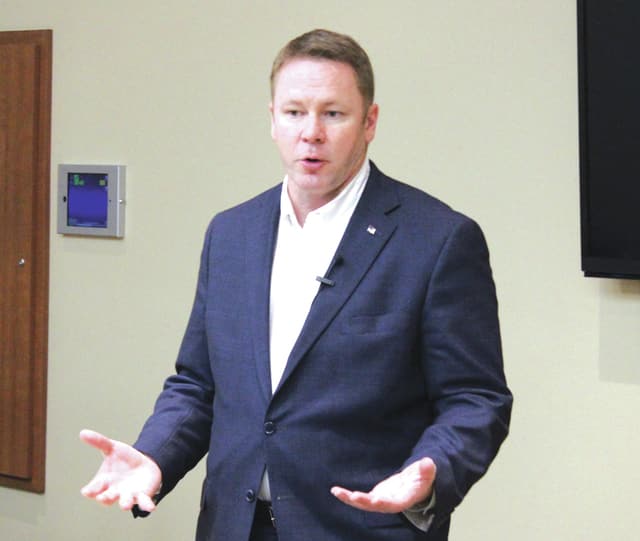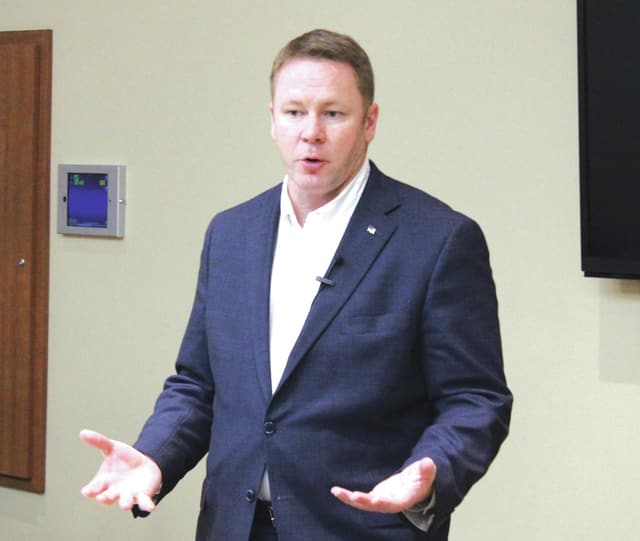

GREENVILLE — With many Americans concerned about the status of health care, all eyes are on what Congress and the newly inaugurated president will do regarding the Affordable Care Act (ACA) in the coming months.
Representative Warren Davidson (R-Troy) addressed some of those concerns at a gathering held at Wayne HealthCare Tuesday.
Davidson, now beginning his first full term representing Ohio’s 8th District, said there are a number of ideas being considered. With a Republican House, Senate and President, the ACA, popularly called “Obamacare” and signed into law in 2010, has been targeted for repeal and replacement.
The primary complaints regarding the plan have included the mandate that everyone must be enrolled or face a penalty, the rising costs of coverage, and the growing lack of health care plans.
Outright repeal of Obamacare, however, also poses risks. The Congressional Budget Office has reported an estimated 18 million Americans would lose health care coverage if ACA is repealed without a replacement plan. Though this is a fear of many, Davidson said even when changes are made, they are not likely to take place until at least January 2019, if not later, and that the Republican majorities in Congress are working on plans to replace Obamacare.
“There will be a date certain. Conservatives generally want to do it as fast as possible, because it’s a rescue mission. This plan is failing, and the reality is, once you bail out the failure of Obamacare, you’re likely to leave people in the lurch anyway,” he said.
As for the specifics, Davidson said there are many proposals being considered though there has been no consensus reached.
“There are about three or four plans — three are what I would call Republican plans — and a fourth that’s essentially Medicaid expansion that some Republicans favor,” he said. “It’s not popular, because it will bankrupt our state, it will bankrupt our country, we can’t afford it, the budget doesn’t balance in it and bankrupting our country is not compassionate.”
Davidson also said that while Congress is looking to repeal and replace Obamacare, it is not necessarily intertwined with efforts to reform Medicare for seniors.
“Speaker [Paul] Ryan in the past has talked about Medicare reforms, and it is a big part about spending in the piece, but it is not inherently part of replacing Obamacare,” he said. “It’s still a good idea to do some reforms to Medicare. It’s very expensive — about 70 percent of that mandatory [government] spending is driven by Medicare and Medicaid spending.”
“Medicaid, however, is a big part of replacing Obamacare,” he added. “You would carry lots of Democrat votes and a handful of Republican ones on Medicaid expansion, which is essentially ‘Obamacare Light’ with just a handful fewer mandates.”
Among the goals of the majority is to let states reclaim more say in administering Medicaid health care plans.
“The Republican plan for that is that it goes away, it goes with a lot of discretion back to the states instead of one mandate,” he explained. “[Ohio] for example has asked for a number of provisions that would give us flexibility to change some of the ways we do it, the way the payments are processed, who qualifies, what we can use the funds for, and that’s a good thing.”
Davidson sought to reassure that despite the election year rhetoric of Republicans to repeal Obamacare, neither Congress nor President-elect Donald Trump are planning to merely dismantle the legislation without a replacement. He floated the idea of refundable health care tax “credits” as a feature which could be implemented.
“When Trump says everyone’s going to have coverage, it doesn’t mean single payer, I’m pretty sure,” he said. “It’s not going to pass the House if he does, but that’s the common feature I think he’s referring to, which is to say, we are going to have a feature that certainly keeps our social safety net in place, and certainly provides a better social safety net than the one we have today.”





